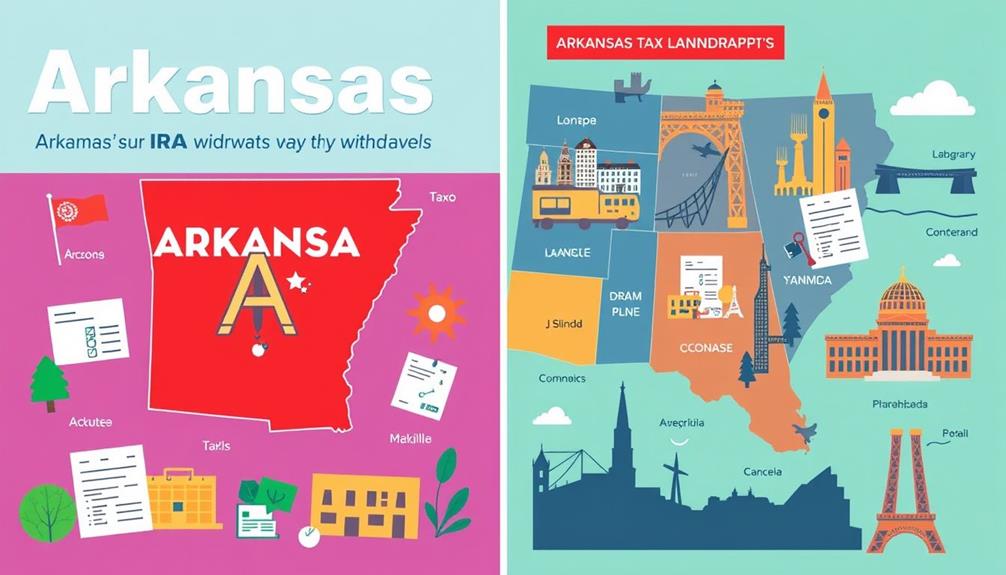When you make withdrawals from your IRA in Arkansas, remember that these withdrawals are subject to state income tax, which can range from 2% to 4.4% based on your total income. If you are 59.5 years or older, you have the option to deduct up to $6,000 of eligible retirement income, including IRA withdrawals. Social Security benefits are not taxed at the state level in Arkansas, making it a more attractive option for retirees. You can also utilize strategies such as Qualified Charitable Distributions to reduce your taxable income even further. There is much to consider regarding the impact on your finances. Continue exploring to gain valuable insights.
Key Takeaways
- IRA withdrawals in Arkansas are subject to state income tax, with rates ranging from 2% to 4.4% based on total income level.
- Individuals aged 59.5 and older can deduct up to $6,000 of eligible retirement income, including IRA withdrawals, from their taxable income.
- Social Security benefits are fully exempt from state income tax, enhancing retirement income for eligible individuals.
- Qualified Charitable Distributions (QCDs) allow those aged 70½ and older to donate up to $100,000 from IRAs tax-free to eligible charities.
- Consulting a financial advisor can help retirees develop strategies to minimize tax liabilities on IRA withdrawals in Arkansas.
Arkansas State Tax Overview

When it comes to understanding Arkansas's tax landscape, you'll find a mixed structure that can impact your finances, especially regarding IRA withdrawals. While the state has one of the lowest property tax rates in the U.S., it balances this with high sales taxes in Arkansas and above-average state income tax rates.
The graduated income tax ranges from 2% to 4.40%, depending on your income level, so it's crucial to plan accordingly.
Fortunately, if you're aged 59.5 or older, you'll benefit from state income tax exemptions on Social Security benefits and certain retirement income, including IRA withdrawals. This can greatly lessen your tax burden during retirement.
However, keep in mind that sales taxes in Arkansas can add up, particularly on essential purchases like groceries and clothing, with a base rate of 6.5% and local jurisdictions imposing additional taxes.
Income Tax Rates in Arkansas

Arkansas employs a graduated income tax system that can considerably affect your overall tax liability. The income tax rates range from 2% to 4.40%, depending on your income level. If you're a single filer, the first $5,099 of your income is taxed at 0%, with higher rates kicking in for larger income brackets.
This structure means that how much you withdraw from your IRA can directly impact how much you owe in Arkansas State Tax.
It's essential to note that retirement income is taxable in Arkansas, including withdrawals from your IRA. However, if you're 59.5 years or older, you can deduct up to $6,000 of eligible retirement income from your taxable income, which could reduce your overall tax burden.
On the upside, Social Security retirement benefits are fully exempt from state income tax in Arkansas, providing valuable relief for retirees.
This exemption means you can enjoy your Social Security without worrying about additional tax retirement implications. Understanding these income tax rates and how they interact with your retirement income can help you plan better for your financial future in Arkansas.
Retirement Income Exemptions

Understanding retirement income exemptions is vital for retirees looking to minimize their tax burden. In Arkansas, individuals aged 59.5 and older can exempt up to $6,000 of eligible retirement income from state income tax. This includes IRA withdrawals, which can greatly ease your financial obligations.
Additionally, Social Security benefits are fully exempt from state income tax, providing further financial relief for those relying on these funds.
If you're a veteran, you'll find that military retirement pay is also exempt, making Arkansas a tax-friendly state for retirees.
However, keep in mind that while the first $6,000 of your retirement income is exempt, any amount exceeding this limit will be subject to the state's graduated income tax rates, which range from 2% to 4.40%.
This means careful planning is important; you'll want to manage your withdrawals and other retirement income strategically to take full advantage of these exemptions.
Taxation of IRA Withdrawals

IRA withdrawals are generally subject to state income tax in Arkansas, which means you'll need to contemplate how these distributions impact your overall tax liability.
In Arkansas, the rates for state income tax range from 2% to 4.4%, depending on your total income level. If you're 59.5 years or older, you can deduct up to $6,000 of eligible retirement income, including your IRA withdrawals, from your taxable income. This deduction can markedly reduce your taxable income and help you manage your tax burden.
It's also worth noting that Social Security benefits are exempt from state income tax in Arkansas. This exemption can provide additional financial relief for retirees.
Additionally, the first $6,000 of distributions from employer-sponsored retirement plans is also exempt from state income tax for individuals over 59.5 years old.
When planning your withdrawals, be mindful of how these factors intertwine. By accounting for state income tax, you can better strategize your retirement income and maximize your resources.
Understanding the tax implications of your IRA withdrawals will help guarantee that you make informed decisions during your retirement years.
Qualified Charitable Distributions

One effective strategy for retirees is utilizing Qualified Charitable Distributions (QCDs), which allow individuals aged 70½ or older to transfer up to $100,000 directly from their IRAs to eligible charities without facing federal income tax on the amount.
This can be particularly beneficial for reducing your tax liability, as QCDs can also satisfy your required minimum distributions (RMDs) for the year.
When you consider making a QCD, keep in mind:
- A direct transfer from your IRA to an eligible charity is vital.
- Only donations to 501(c)(3) charitable organizations qualify, excluding donor-advised funds and private foundations.
- You can continue supporting your favorite causes while minimizing taxable income.
- Maintaining proper documentation, like acknowledgment letters from the charitable organizations, is important for verifying your QCD for tax purposes.
- You can make a meaningful impact on your community without incurring additional tax burdens.
Sales and Property Taxes

Sales and property taxes often play a considerable role in your overall financial picture during retirement. In Arkansas, understanding these taxes can help you manage your budget more effectively. Arkansas has a state sales tax rate of 6.5%, and with local taxes, it can reach up to 12.625%. This is particularly important for retirees on fixed incomes, as groceries are subject to sales tax, impacting your monthly expenses.
Here's a quick overview of the key tax factors for retirees in Arkansas:
| Tax Type | Rate | Notes |
|---|---|---|
| Sales Tax | 6.5% + local (up to 6.125%) | Groceries are taxed |
| Property Tax | 0.53% average effective | Among the lowest in the U.S. |
| Homestead Exemption | Available for 65+ | Reduces property tax burden |
| Prescription Drugs | Exempt from sales tax | Financial relief for healthcare costs |
| Total Sales Tax | Up to 12.625% | Can greatly affect budgets |
Additionally, homeowners aged 65 and older can qualify for a homestead exemption, easing their property tax burden.
Comparison With Other States

When you compare Arkansas to its neighboring states, the tax landscape for IRA withdrawals becomes clearer.
While Arkansas offers a deduction for retirement income, states like New York and New Jersey impose considerably higher tax rates.
Additionally, Arkansas's lack of tax on Social Security benefits gives it an edge over states that do tax these benefits, enhancing its appeal for retirees.
Arkansas Vs. Neighboring States
Steering state tax implications on IRA withdrawals can greatly impact your retirement planning, especially in Arkansas compared to its neighboring states.
Arkansas allows individuals aged 59.5 and older to exempt the first $6,000 of their IRA distributions from state income tax, making it somewhat favorable for retirees. However, this contrasts sharply with states like Tennessee and Texas, where there's no state income tax on IRA withdrawals at all.
Consider these differences:
- Missouri: Different tax exemption rules for retirement income.
- Louisiana: Taxes on retirement income, including IRA withdrawals.
- Oklahoma: Income tax rates on IRA distributions range from 0.5% to 5%.
- Tennessee: No state income tax on retirement distributions.
- Texas: A significant tax advantage with zero state income tax.
In Arkansas, while you can benefit from a $6,000 exemption, any withdrawals above that amount will still be subject to state income tax.
This makes understanding the taxes on retirement income essential as you navigate your retirement distributions, especially when comparing your options with neighboring states.
Tax Rates Comparison
While Arkansas offers some tax advantages for retirees, its graduated income tax on IRA withdrawals can be less appealing compared to other states. Here's a quick comparison of state income tax implications for IRA withdrawals across various states:
| State | State Income Tax on IRA Withdrawals |
|---|---|
| Arkansas | 2% – 4.4% |
| Florida | No state income tax |
| Illinois | Flat rate of 4.95% |
| Mississippi | Exempt from state taxes |
| Alaska | No retirement income tax |
| Wyoming | No retirement income tax |
| California | Up to 14.4% |
As you can see, several states either impose no state income tax or have exemptions for retirement income, making them more attractive for retirees. States like Florida and Wyoming provide a stark contrast to Arkansas's tax structure. While Arkansas allows a deduction of up to $6,000 for individuals aged 59.5 and older, the overall state income tax on IRA withdrawals might still leave you considering your options.
Retirement Income Exemptions
Many retirees look for states that offer tax-friendly environments, particularly regarding IRA withdrawals and other retirement income. When comparing Arkansas to other states, you'll find both pros and cons in its retirement income exemptions.
- In Arkansas, individuals aged 59.5 and older can exempt up to $6,000 of eligible retirement income from state income tax.
- Florida and Alaska stand out with no state income tax, so you won't owe anything on IRA withdrawals or retirement income.
- Iowa allows exemptions for residents aged 55 and older, making it a more appealing choice if you're not yet 60.
- Unlike Arkansas, states like Illinois don't tax most pension and retirement distributions, which can greatly impact your overall retirement budget.
- However, military retirement pay is exempt from state taxes in Arkansas, aligning it with several other states that recognize the sacrifices of veterans.
Financial Planning Strategies

As you navigate your retirement years, implementing effective financial planning strategies is essential to minimize tax liabilities from IRA withdrawals. Consider working with a financial advisor to develop a tailored withdrawal strategy that aligns with your retirement income needs while keeping your adjusted gross income low.
One effective approach is to take advantage of the $6,000 deduction for eligible retirement account withdrawals in Arkansas, especially if you're 59.5 or older. Timing your IRA withdrawals to stay within lower tax brackets can also greatly reduce your tax burden.
Additionally, you might explore Qualified Charitable Distributions (QCDs) to lower your taxable income. QCDs can satisfy required minimum distributions (RMDs) while being excluded from your adjusted gross income.
Here's a table summarizing key strategies:
| Strategy | Benefit |
|---|---|
| IRA Deduction | Reduces taxable income by up to $6,000 |
| Timing Withdrawals | Keeps you in lower tax brackets |
| QCDs | Excluded from adjusted gross income |
| Consult a Financial Advisor | Tailors strategies to individual needs |
Resources for Retirees

Retirees in Arkansas often find a wealth of resources to help them navigate the complexities of retirement planning and state tax implications.
Understanding how to manage your tax obligations can greatly impact your financial well-being, especially when considering factors like common financial terms that may affect your retirement strategy.
Here are some valuable resources you can tap into:
- Financial Advisors: Experts like SmartAsset can guide you through retirement strategies and tax implications.
- State Tax Guides: Access state-specific guides that break down tax exemptions on IRA withdrawals for those over 59.5.
- Social Security Resources: Learn how your benefits are fully exempt from state income tax, adding to your retirement income.
- Community Workshops: Local organizations often host sessions on property tax rates and budgeting for retirees.
- Online Forums: Join discussions with fellow retirees to share experiences and strategies about managing retirement finances in Arkansas.
Frequently Asked Questions
Does Arkansas Tax IRA Withdrawals?
Yes, Arkansas does tax IRA withdrawals. You'll pay state income tax based on your applicable rate. If you're over 59.5, you can deduct up to $6,000 from your taxable income, reducing your tax liability.
Do You Pay State Income Tax on IRA Withdrawals?
Imagine the weight of your hard-earned savings in your hands. When you withdraw from your IRA, you'll pay state income tax on that amount, unless you qualify for specific deductions. It's crucial to plan wisely.
What States Require Tax Withholding on IRA Distributions?
Many states require tax withholding on IRA distributions, including California, New York, and Florida. You should check your state's specific rules, as requirements can vary considerably, impacting your overall tax liability when withdrawing funds.
Do I Have to Pay Taxes When I Withdraw From My Traditional Ira?
When you withdraw from your Traditional IRA, you'll typically face taxes. Just like knights in shining armor had to pay their dues, you must consider income tax based on your total earnings during retirement.
Conclusion
As you navigate the winding river of retirement, remember that understanding Arkansas's tax implications for IRA withdrawals can help you steer clear of unexpected rapids. By knowing the landscape of income tax rates and retirement exemptions, you can chart a smoother course. With careful planning and the right resources, you'll find yourself on a tranquil lake, enjoying the fruits of your labor. Embrace this journey, and let the currents of knowledge guide you to a prosperous retirement.










